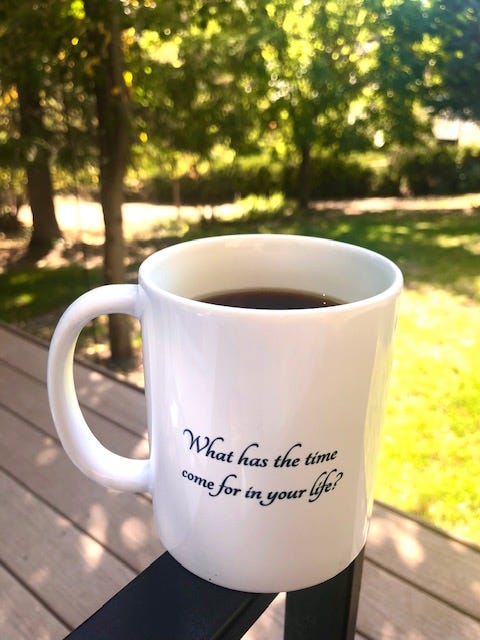I’ve always tended to be a night owl, so my morning routine consists of a slow trudge toward waking up and engaging in life. When I was still working, of course there were the days that I had to embrace the readiness routine of pulling myself together so I would be presentable and alert in the office. My preference, however, is to stay in my pajamas, pour myself a steaming hot cup of black coffee, check the news of the day and scan social media. Once the caffeine begins to awaken my senses, it’s usually ok to talk to me and I might even be coherent. Truth be told, I’ve never been a cheerful morning person. I like to wake up slowly and peacefully. It was harder when we had kids. Offspring don’t wait for you to wake up before they start asking for things like food.
I used to revel in days that I could stay up till the wee hours and sleep in the next morning. My husband was really nice about getting up with the kids and feeding them so they would let me wake up slowly. I took on the night shift with the child who didn’t need much sleep and was still wide awake at 10:00pm. Our routine worked pretty well with our internal clocks.
Something happened a number of years ago that didn’t just mess with my circadian rhythm, it completely broke it. This may sound strange, but we went on a ten-day camping trip with my sister and brother-in-law. We shared a tent camper and the other three people in the tent were early risers. Sleeping in was not happening. So every day I woke between 5:30 and 6:30am on that trip. When I got home, suddenly I could not sleep past 6:30 even if I stayed up till midnight. Consequently, I could no longer stay up late because I need my eight hours and couldn’t function well on less. I know some people who do perfectly well with six hours of sleep, but that is not me. It was a sad realization that my youth was departing and forcing me to keep “old people hours”.
According to The Sleep Foundation website, “Circadian rhythms are 24-hour cycles that are part of the body’s internal clock, running in the background to carry our essential functions and processes. One of the most important and well-known circadian rhythms is the sleep-wake cycle. Different systems of the body follow these rhythms that are synchronized with a master clock in the brain. This master clock is directly influenced by environmental cues, especially light. When properly aligned, a circadian rhythm can promote consistent and restorative sleep. But when the rhythm is thrown off, it can create significant sleeping problems such as insomnia.”
I am pretty sure that winter in my part of the world also does a number on my circadian rhythm. When it’s still dark at 7:30am and dark again at 4:00pm, my body clock says I need to be asleep more. Hibernation would not be out of the question. Now that it’s February, I’m beginning to see some lengthening of our daylight hours. It feels like it takes forever to get past the darkest months, but I just read today that it’s only 35 more days until we return to Daylight Savings Time. I look forward to that day every year as much or more than my birthday, which happens to fall around the same time.
February is skipping along nicely toward the first signs of spring. I know for some of my readers, it’s counting down to fall. Whichever season you are headed for, I hope your circadian rhythms are adjusting appropriately. If not, I recommend a ten-day camping trip. It could very well be a life changer.




My sleep patterns have been terrible for months. It got worse as I stayed awake for things that happened in the early hours of the morning (2 to 4am). But I still wake up at abt 6 or 7am. So during the day I get really tired, nap & then of course have trouble sleeping at night. I try not to nap, but I get so tired. At least when I go on my trip to Canada, my body clock will be in sync 😂.
Weekdays struggle to get up very different at weekends up and out filling my day out and about ❤️❤️🌻🌼🌺